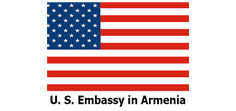In an interview with Azatutyun (Liberty) radio station on February 22, 2018, candidate for the fourth president of Armenia, Armenia’s Ambassador to the United Kingdom Armen Sargsyan said the following while speaking about political prisoners: “Obviously, the problem is not clear because if you make an inquiry to any international organization…at least I personally have not seen any international organization declare that a particular person is a political prisoner in Armenia.”
During a public event organized by New Armenia Movement on December 31, 2015, at Yerevan’s Freedom Square, activist Gevorg Safaryan and several other members of the movement were arrested amid a scuffle between the members of the movement and the police. Later, Safaryan was charged with using force against Gegham Khachatryan, the commander of the 4th Special Battalion (Angels) of the Police.
On January 16, 2017, after a one-year trial, the Court of General Jurisdiction of Kentron and Nork-Marash Administrative Districts of Yerevan sentenced Safaryan to two years’ imprisonment. Safaryan has been behind the bars for already a year.
On January 8, 2016, a few days following Safaryan’s arrest, international human rights organization Human Rights Watch, in the face of the head of its Europe and Central Asia division, Hugh Williamson, sent a letter to the RA Prosecutor General Gevorg Kostanian calling on the prosecutor’s office to take action to safeguard Gevorg Safaryan’s rights. In its letter, the international human rights organization clearly stated that they were concerned that Gevorg Safaryan was targeted for his oppositional political beliefs.
Meanwhile, according to the Parliamentary Assembly of the Council of Europe (PACE) and the Amnesty International, those, deprived of their personal liberty for criticizing or opposing the current authorities, are considered political prisoners.
According to the PACE definition, political prisoners are those deprived of their liberty “if the detention has been imposed for purely political reasons without connection to any offence”.
In 2012 the Parliamentary Assembly of the Council of Europe adopted resolution 1900 which gave a stronger definition of a political prisoner. According to that resolution a person deprived of his or her personal liberty is to be regarded as a ‘political prisoner’ if the detention has been imposed in violation of one of the fundamental guarantees set out in the European Convention on Human Rights and its Protocols (ECHR), in particular the freedom of assembly and association; if the detention has been imposed for purely political reasons without connection to any offence; etc.
In other words, in spite of Armen Sargsyan, international organizations have indeed given names of political prisoners in Armenia.

 FACTOMETER
FACTOMETER









